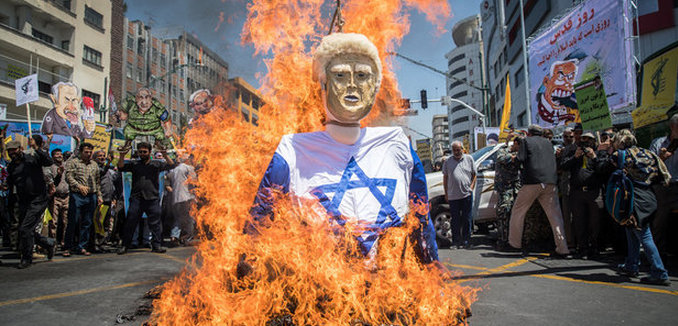In a 2013 news item on Iran’s annual Quds Day march, the Associated Press reported that newly elected President Hassan Rouhani said at the event that Israel was an “old wound” that needed to be removed.
The AP later provided some context for those remarks, “Rouhani spoke at an annual pro-Palestinian rally marking ‘Al-Quds Day’ — the Arabic word for Jerusalem — and although his remarks appear contrary to his outreach efforts to the West, they should also be seen in the context of internal Iranian politics where softening the establishment’s anti-Israeli stand is not an option.”
Despite the AP’s efforts to downplay the extremism of Rouhani’s comments – that he had no choice but to express his opposition to the Jewish state – it also reported, “In the capital, Tehran, tens of thousands took to the streets, chanting ‘Down with America’ and ‘Death to Israel.'”
In a report about last week’s cancelled soccer match between Israel and Argentina, The Washington Post reported, “The BDS movement aims to pressure Israel into complying with international law vis-a-vis its policies toward the Palestinians by discouraging the purchase of Israeli goods, pressuring international companies not to conduct business in Israel and urging celebrities not to visit or perform in the country.”
Omar Barghouti, one of the founders of the Boycott, Sanctions, and Divestment (BDS) campaign, has been clear about the goal of his movement. He has said, “A Jewish state in Palestine in any shape or form cannot but contravene the basic rights of the indigenous Palestinian population and perpetuate a system of racial discrimination that ought to be opposed categorically….Definitely, most definitely we oppose a Jewish state in any part of Palestine. No Palestinian, rational Palestinian, not a sell-out Palestinian, will ever accept a Jewish state in Palestine.”
Nor is Barghouti alone among proponents of BDS in calling for an end to the modern state of Israel.
If the Iranian regime were strictly pro-Palestinian, the marchers would be chanting “Two states for two peoples” not “Death to Israel.” If BDS supported peace based on a two-state solution, Barghouti would be talking about “two states, living side-by-
While calling the Iranian regime pro-Palestinian or writing that the BDS campaign is interested in getting Israel to be in compliance with international law, makes them sound innocuous or even praiseworthy, it is also highly misleading. Neither Iran nor the BDS campaign accept the legitimacy of the Jewish state, though they may have mapped out different paths to that end. Both, though, are properly classified as “anti-Israel.”
Using euphemisms to obscure the anti-Israel nature of Iran or the BDS campaign took on additional significant turn earlier this month, when Armin Rosen and Liel Leibovitz reported that the leading United States-based BDS organization has set up its website to allow tax-free donations to a Palestinian group that includes Hamas and other terrorist organizations. While Rosen and Leibovitz noted that there is no way to show that any donations through US Campaign for Palestinian Rights have gone to the terrorist groups, the campaign “is responsible for ensuring that the money doesn’t go to terrorist organizations.” There is no indication that the US Campaign has established any safeguards to prevent this.
Nor is this the first time that BDS has been connected to terror groups.
Former Treasury Department official and current Senior Vice President of the Foundation for Defense of Democracies Jonathan Schanzer testified before Congress in April 2016 and said that the leadership of “three organizations that were designated or shut down, or held civilly liable for providing material support for the terrorist organization Hamas … appears to have pivoted to leadership positions within the American BDS campaign.”
The examples of Iran and BDS show that when a person or organization claims to be pro-Palestinian, it must be asked if that is really their defining characteristic, or if their professed concern for the Palestinians masks their opposition to Israel.
In his 2009 Quds Day message, Iranian Supreme Leader Ayatollah Ali Khamenei made this equivalence explicit, “Those who are resisting and suffering innocently in the occupied Palestinian lands are the only ones offering hope about the freedom of Palestine and the annihilation of the usurping Zionist regime.”
The documented ties of the BDS campaign to terror groups show that many who are anti-Israel don’t draw any lines when it comes to the means by which they seek their goal of ending Israel’s existence.
[Photo: Mehr News ]




